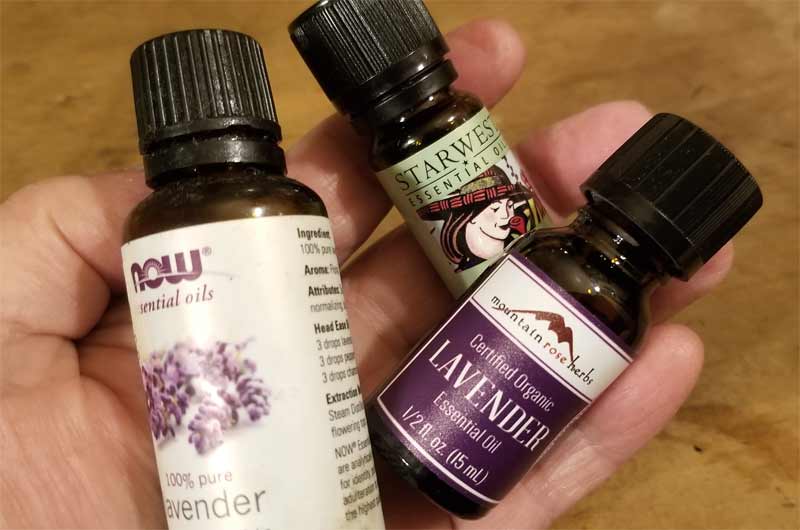Home remedies for stress

The number one herb for stress is lavender.
The scent of lavender alone can bring about deep relaxation, peaceful feelings, and pain relief in less than thirty minutes. When treating stress, most people respond favorably to lavender essential oil. It is readily available, a good value, and effective.
It's easy to treat the symptoms of stress with lavender oil. Just put one drop on each wrist, relax in a comfortable chair, and inhale the aroma. You will feel better within a few minutes.
Stress causes many symptoms.
This post covers herbs and natural remedies for lowering your stress levels, but I also have pages devoted to the following symptoms of stress. Read on to dig deeper into healing your specific problems.
Time tested herbs for stress
There are many herbs known for helping to relieve stress.
Passion flower vine, ashwagandha, wild lettuce, chamomile, catnip, lemon balm, valerian, St. John's wort, bee balm, white oak, and willow are the most well-known. They have all been used for centuries and are proven to work.
Herbal teas can help relieve stress and its symptoms.
Herbal teas are inexpensive and really help to stop stress. Just sipping a cup of hot tea can help no matter what flavor or herb you choose!
Most all medicinal herbs are healing and bring down stress levels when sipped slowly.
Some teas are particularly suited for treating the symptoms of stress.
- Rosemary tea is useful for stabilizing mood swings.
- Bee balm and catnip tea can aid in getting restful sleep.
- Valerian, lemon balm, skullcap, or passion flower teas are good choices if you have panic attacks.
Scent affects our response to stress.
Using the right scents in herbal medicine is a big part of the healing process.
For example, the smell of cinnamon and apples can relieve some cases of stress-related depression. It's hard to be depressed when remembering grandma's cozy kitchen or mom's apple pie.

The science of stress and herbs
Studies show that adaptogens like ashwagandha are safe and effective remedies for treating the effects of stress. For best results, use full-spectrum ashwagandha root extract.
Adaptogen herbs improve the ability to cope with stress by reducing serum cortisol (which increases in stressful conditions). Two other useful adaptogens include licorice and astragalus.
Benefits of using natural remedies include low cost, availability, and fewer side effects than when using prescription drugs.
Studies done in 2022 show that passion flower vine is effective for reducing stress. Passion flower vine acts on the hippocampus, which is shown to be a target area for stress reduction.
Passion flower is available in liquid extract, tablets, capsules, and teas.
Lavender has been proved to reduce heart rate and blood pressure, which can help stop the harmful effects of stress.
Lavender also increases activity in the temporal lobe of the brain, increasing delta-waves, which brings about a restful, deep sleep. It is used externally in essential oil form.

Aromatherapy is perfect for treating stress.
Different scents work in different ways. Try inhaling lavender essential oil for uplifting the spirit and getting rid of stress.
Neroli essential oil, made from orange blossoms, is known for its calming effects. Combine neroli with lavender and almond oil and use in soothing massages. This treatment will calm even the most severe case of nerves. The right scent can make even the most awful circumstances seem better.
Angelica essential oil is noted for its ability to aid in relaxation. Just a sniff of the vapors can help get rid of stressful feelings.
Another essential oil useful for treating stress and related symptoms is rose oil. When damask rose oil is combined with sandalwood or patchouli the calming effect is remarkable.
Use in a lotion, massage, or a warm herbal bath for best results.
Some people find that ylang-ylang essential oil is an aid to relaxation. Others might choose chamomile essential oil.
It takes some trial and error to find out what works best for each person so don't give up. If you keep at it, the right herb, oil, or blend will come along.
Aromatherapy produces great results when treating tension headache.
As mentioned earlier, lavender is a fabulous herb for relieving stress. It really helps stop stressful, tension headaches.
Lavender EO is distilled from lavender flowers and leaves in a process that is a lot like making brandy or moonshine. Instead of collecting alcohol, the lavender oils are extracted from steam and bottled for medicinal use. Always purchase the highest quality oils that you can find.
What exactly is stress?
According to the Oxford Dictionary, stress is a state of mental or emotional strain or tension resulting from adverse or very demanding circumstances. Stress challenges your ability to cope in everyday life.
Stress is your body's response to fear. Stress and panic attacks are common in today's society where televisions bring disturbing world events right into our living rooms and phones bombard us with bad news.
Fear of failing, fear of dying, fear of poverty, fear of being alone, fear of the future, and fear of change cause many negative symptoms such tension headache and nervous conditions.
Is stress dangerous?
Yes, it is! Prolonged stress depletes the body of its natural tranquilizers. Bad diet and poor eating habits contribute to the problem.
Add in polluted air, contaminated water, pesticides, environmental hazards, sedentary lifestyles, and the nightly news. It's no surprise that the population is nervous and stressed-out.
Everyone is affected by varying degrees of stress. Too much stress causes fatigue and all kind of health issues. Serious stress, such as a job loss or death of a loved one, can become life threatening!
Stress related nervous disorders have many and varied symptoms depending on the individual. Some people are more high-strung. They seem to suffer more from stress than laid-back types.
Tension headaches, inability to relax, mood swings, heart palpitations, sadness or anger with no obvious cause, lack of motivation, irritability, and feelings of emptiness indicate the presence of too much stress in a person's life.

What causes the most stress?
Causes of extreme stress include loss of a loved one, serious money problems, drug addiction, withdrawals, alcohol dependence, lack of sleep, overwhelming personal problems, sudden changes in lifestyle, certain allergies, chronic illness, mineral depletion, noise pollution, overcrowding, and poverty.
If you have any of these things happening in your life, you need all the herbs you can get. You also need a support system with friends or family members that will listen.
Talking to someone you trust can really help! Please seek professional help if you have thoughts of hurting someone else, hurting yourself, or of suicide.
What are the symptoms of stress?
Symptoms of stress vary among individuals but may include:
- Losing interest in activities
- Creases in the forehead
- Clenched jaws
- Constipation
- Diarrhea
- Weight gain
- Weight loss
- Mood swings
- Crying spells
- Becoming short-tempered
- Tiredness
- Anger
- Insomnia
- Paranoia
- Panic attacks
- Anxiety
- Sadness
- Chronic head and neck aches
- High blood pressure
- Lowered immunity
- Upset stomach
- Skin disorders
- Hives
- Kidney malfunction
- Frequent infections
- Asthma
- Heart disease
- Mental problems
- Nervous breakdown
- Migraines
- Ulcers
- Back pain
- Onset of diabetes
- PMS
- Digestive problems
- Heart disease
As you can see from the list above, many health problems are brought on by stress.

Good nutrition is vital to controlling the harmful effects of stress.
The body is designed to handle stress but sometimes it needs help. Protein and mineral rich foods are good choices for helping the body to overcome stress.
Vegetables, whole grains, seafood, soy foods, fresh fish, carrots, brown rice, eggs, and sprouts can greatly benefit the body in stressful times. Adding brewer's yeast, toasted wheat germ, sunflower seeds, and molasses to the diet is also recommended.
During times of stress, it is good to support the adrenal glands with green drinks, calcium supplements, vitamin C supplements, ginseng tea, astragalus, ginkgo biloba, or licorice extract.
Other herbs to try include chaga mushroom, catnip, rosemary, and lemon balm.
More ways to reduce stress
Stress is immediately reduced when having a good laugh. Try to find a comedy special on Netflix when stress becomes overwhelming.
Regular deep breathing exercises, meditation, prayer, aerobic exercise, listening to favorite music, visiting with friends, short vacations, creative hobbies, getting out into the fresh air, and celebrating fun, family traditions can also help.
Fighting workplace stress
If your workplace is stressful, learn to delegate responsibilities whenever possible. Don't sweat the small things.
The world will continue even if a few things are left undone. Learn to live in the here and now.
You can't change the past and the future hasn't arrived yet. Appreciate life as it is happening and worries will usually fade away. As they say, “Take time to smell the roses.”
What else can I do to fight the effects of stress?
When under a lot of stress, avoid caffeine and smoke. Never eat on the run, while working, between meals, or while watching television.
Meals should be a relaxing time so that food can be properly digested.
You can also try other alternative methods of healthcare such as light therapy, sound therapy, acupuncture, and massage.
Try reflexology for stress.

CBD oil is also known to help reduce the symptoms of stress.
CBD oil can help, but not if it is of poor quality. When purchasing CBD oil, be sure to buy from certified sellers.
CBD oil can help you deal with stress, and it also lessens the severity of tension headaches. In fact, good CBD oil is one of the best legal pain relievers that exists.

*Always consult with a healthcare professional before taking any herbal remedies especially when pregnant, nursing, or taking prescription medications.
Sources:
https://www.ncbi.nlm.nih.gov/pmc/articles/PMC3573577/
https://www.ncbi.nlm.nih.gov/pmc/articles/PMC9737923/
Blessings to you and yours!
Thanks so much for reading my blog. Jan.

*Note - the information on this website has not been evaluated by the Food and Drug Administration.
© 2005-2024 website design and content by Janice Boling